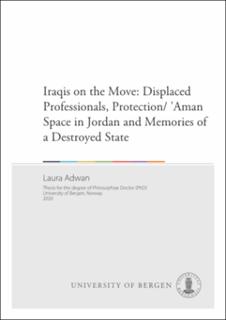| dc.description.abstract | Recent events of forced displacement in the Middle East are compelling millions of people to move within the borders of their country, while forcing many others to become strangers in other lands. In the modern era categorized by the nation-state rise, the military and disciplinary power of ‘national’ and ‘enemy’ states has been the main factor in controlling the movements of people. Forced migration has marked the Iraqi state-building history since the early twentieth century, when various colonial and post-colonial regimes used population movement as an instrument of rule, at various scales. What is unique in the phase of postinvasion Iraq (post-2003) is that displacement has not only affected certain segments of the Iraqi society, but has extended to displace the whole system of rule with its state institutions, causing a rupture in the former urban inter-mixed communities. This has led to sweeping the Iraqi space of many of its original communities, the members of which have felt, as expressed in the observations and stories in this thesis, that they have had little or no space in the New Iraq. These include whole sections of the Iraqi society, in addition to professionals and academics from various sects and religions, leading to a sharp decline in the former Baghdadi urban inter-communal way of life, education and work.
The thesis is based on ethnographic fieldwork in Amman, among Iraqi state employees and highly skilled professionals during 2010 and 2011, the majority left after 2003, specifically between 2005-2009, and few had left during 1990s and were still unable to return. Their lives have been shaped by a once wealthy oil developmental state severely affected by three wars within two decades and thirteen years of comprehensive UN-economic sanction. The destructive US-led war and invasion of 2003, the military occupation and the new ruling sectarian regime resulted in a large flow of Iraqis across the borders into neighboring countries.
The international and regional response has been limited and restricted to the provision of temporary space of protection/himaya within the region which has addressed the developmental needs of host state institutions more than addressing the urgent needs of Iraqis in the Jordanian Kingdom (who is not a signatory to the 1951 Convention that defines the rights and obligations of refugees and the host country). Getting resettlement in a third country was restricted to limited numbers of Iraqis (able to provide a well-founded story of fear of being persecuted), although until the end of my fieldwork, Iraqis were still crossing their country’s borders in growing numbers in search of ʾamān (the state of feeling safe). Iraqis— formerly state-employees and professionals who experienced personal and collective losses and on top of that became jobless and status-less— were torn between waiting in conditions of uncertainty in Jordan for assistance that was pre-conditioned by the ability to present a strong evidence of ‘need’ (usually ‘visible’ need) on the one side, and on the other side, they were actively responding to their urgent need to make spaces of ʾamān as they perceive ʾamān for themselves and their families (and households).
To understand this complex condition of displacement and protection, this thesis explores the stories and experiences observed among Iraqis within relevant historical, political and socio-economic contexts. Making ‘amān in conditions of war‒ or “well-being in a world of want” as Michael Jackson (2011) described it in another region and context‒ was not a new experience for these Iraqis who lived through longer events of social transformation during times of state development, wars and economic sanctions.
I argue, using ethnographic details that the displacement of this group of Iraqi professionals and state-employees following the destruction of several aspects of their social and cultural life provides a space to re-think forced displacement in the wider context of structural violence. The thesis uses ‘amān as a generative concept, to explore different meanings and possibilities of being-in-the-world among this group of Iraqis “in its relation to what is possible”. In the fragmented spaces in Iraq and Jordan, ʾamān was a term shared collectively by Iraqis to explain how they relate to the world around them, their memories of good old days, pain, suffering during times of displacement and wars, and their dreams to reach a safe State. | eng |
